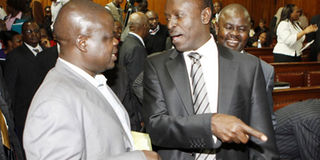Petitions: IEBC to file response

Activist Omtatah Okoiti (left) chats with lawyer Mohammed Nyaoga (right) in court November 8, 2012. Mr Nyaoga, who is representing the IEBC in a Supreme Court presidential petition, said the commission will file its response March 19, 2013. FILE
The Independent Electoral and Boundaries Commission will file its response to petitions challenging the election of Uhuru Kenyatta as president.
IEBC lawyer Mohammed Nyaoga told the Nation that the commission will respond to two petitions filed at the Supreme Court at 2pm.
The petitions by Raila Odinga and civil society group, African Centre for Open Governance (Africog) were filed on Saturday.
Mr Odinga wants the court to nullify IEBC’s declaration of Uhuru Kenyatta as president-elect and William Ruto as deputy president-elect.
He also seeks to persuade the court that the whole electoral process leading to that declaration was null and void and a fresh poll should be held.
“The electoral commission failed to establish systems which are accurate, verifiable and transparent and declared results which in many instances had no relation to votes cast at polling stations. They developed opaque methods intended to manipulate results and excluded my representatives from the process,” swore Mr Odinga.
He argues that anomalies were observed in the process from voter registration, transmission of results, to tallying and accused IEBC of declaring results on the basis of unsigned Form 36, multiplying Form 36 in some constituencies and altering entry files.
Africog said its petition is not to challenge the results or the declaration of Uhuru Kenyatta as president-elect but the process the IEBC used to tally the final results.
The organisation had filed a similar petition at the High Court a day after the IEBC resorted to manual tallying of presidential elections. But a three-judge bench of justices Isaac Lenaola, Weldon Korir and David Majanja dismissed the petition on grounds that the High Court lacked jurisdiction to determine issues concerning presidential elections and instead referred them to the Supreme Court.
Africog claims the electoral commission violated provisions of the Constitution which required them to conduct a transparent voter tallying process.



